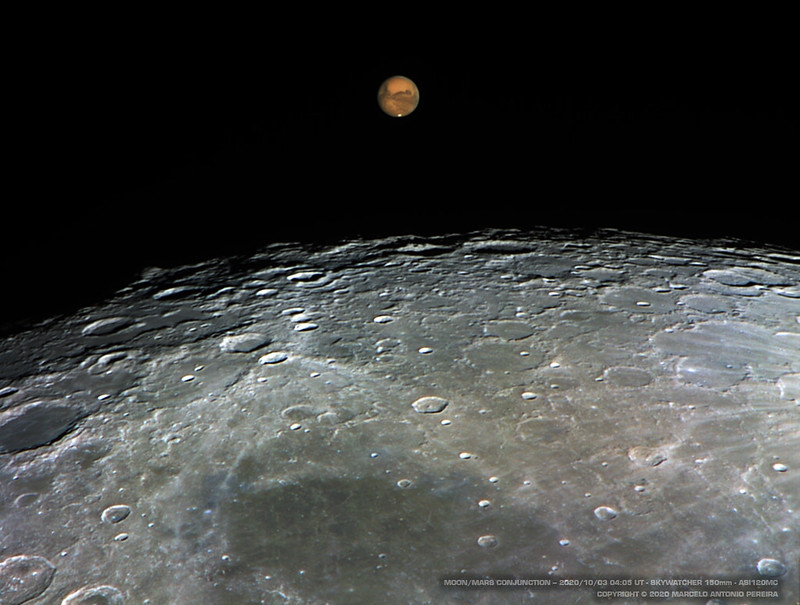Page 6 of 6
Re: Submissions: 2020 September
Posted: Thu Oct 01, 2020 9:45 pm
by StefanMuckenhuber
SH2-155 - Cave nebula
Collaboration between Stefan Muckenhuber and Bruno Stampfer
Full resolution:
https://www.astrobin.com/full/270338/C/?nc=user
Re: Submissions: 2020 September
Posted: Sat Oct 03, 2020 12:17 pm
by Luc CATHALA
Hello
before the arrival of a week of bad weather in the south of France I quickly made a series of films on Mars with my homemade 625 mm newton a 742 nm filter a 5X barlow televue a QHY 5III178M camera and above all low turbulence , I was able to get my best image of Mars.
Many craters are visible. This confirms that the best part of a big telescope is the sky.
4 mn acquisition at 125 img/s 1500 img stacked on 30000 with AutoStackkert 3 processing with Registax 6 and Photofiltre.
Clear skies.
Luc CATHALA Mazan in France.
http://www.astrosurf.com/uploads/monthl ... ae69ec.jpg
Re: Submissions: 2020 September
Posted: Sat Oct 03, 2020 3:22 pm
by Sady Contreras
 https://flic.kr/p/2jNCkHU
https://flic.kr/p/2jNCkHU
Conjuntion Moon Mar From Santiago Chile
2/10/2020 23:35
Re: Submissions: 2020 September
Posted: Sat Oct 03, 2020 3:28 pm
by ramdom
Squid nebula Ou4 (c-orgb), also includes: v419 Cephei.
Total integration: 3280 minutes/~55 hours (*632 x 300s for O3 + **60 x 120s for OSC).
Cameras: *QHY163M (16mp mono) and **QHY247C (24mp OSC) CMOS cooled to -20 and -15 degrees C.
Telescopes: *Takahashi FC100DF Steinheil fluorite doublet and **Stellarvue SV70T triplet apochromat refractors @ f/4.9 and @ f/4.8.
Reducers: *Takahashi FC-35 (0.66x) and SFFR70-APO (0.8x).
Mount: Paramount MyT.
Filters: 1.25" Astrodon 5nm Ha, 3nm O3, 3nm S2 and **2" Baader UV-IR-Cut
Software: TheSkyX Pro, Sharpcap, PixInsight.

- ou4_c_orgb_632x300+60x120_3280m_55h.inline.jpg (42.36 KiB) Viewed 25250 times
Inline image with reduced quality uploaded to the forum. Full resolution images of all versions are available at
https://www.astrobin.com/jdaa90/ and of the primary image at
http://ram.org/images/space/scope/1.4+7 ... 0m_55h.jpg
Re: Submissions: 2020 September
Posted: Sat Oct 03, 2020 4:41 pm
by marceloanp
Hi everyone...
Thank you for acept my registration. This is my first pic here. It's the conjunction Moon Mars from east cost of Brazil last night.
Thank you.
Marcelo Antonio Pereira
Linhares - Brazil
Frames Stacked: 300.
Time: 2020/10/03 04:05 UT
Camera: ASI120MC
Telescope: Sky-Watcher 150mm F/6.6 @ f/13.3.
Mount: Vixen GP upgraded Sky-Watcher Goto kit
Software: Firecapture, AS!3, Registax, Photoshop

Re: Submissions: 2020 September
Posted: Sun Oct 18, 2020 6:41 pm
by Ann
marceloanp wrote: ↑Sat Oct 03, 2020 4:41 pm
Hi everyone...
Thank you for acept my registration. This is my first pic here. It's the conjunction Moon Mars from east cost of Brazil last night.
Thank you.
Marcelo Antonio Pereira
Linhares - Brazil
Frames Stacked: 300.
Time: 2020/10/03 04:05 UT
Camera: ASI120MC
Telescope: Sky-Watcher 150mm F/6.6 @ f/13.3.
Mount: Vixen GP upgraded Sky-Watcher Goto kit
Software: Firecapture, AS!3, Registax, Photoshop

Thank you for this fine portrait of the conjunction between the Moon and Mars! And welcome to Starship Asterisk*!

Ann
Re: On a plot of Cassiopea
Posted: Sun Oct 18, 2020 6:42 pm
by alcarreño
Ann wrote: ↑Sun Sep 27, 2020 4:12 am
I just spent a lot of time identifying all the bright stars and nebulas in this fabulous picture! Thank you!

Ann
thank you very much.
The mosaic grows little by little. To this day, he already has 25 photographs and it looks like this.
A greeting.
 MergeMosaic_procesado RGBHalfa_80porcien
MergeMosaic_procesado RGBHalfa_80porcien by
Raul Villaverde, en Flickr
Re: On a plot of Cassiopea
Posted: Sun Oct 18, 2020 6:57 pm
by Ann
alcarreño wrote: ↑Sun Oct 18, 2020 6:42 pm
Ann wrote: ↑Sun Sep 27, 2020 4:12 am
I just spent a lot of time identifying all the bright stars and nebulas in this fabulous picture! Thank you!

Ann
thank you very much.
The mosaic grows little by little. To this day, he already has 25 photographs and it looks like this.
A greeting.
 MergeMosaic_procesado RGBHalfa_80porcien
MergeMosaic_procesado RGBHalfa_80porcien by
Raul Villaverde, en Flickr
Thank you! It's a truly lovely and highly resolved mosaic of most of Cassiopeia and a bit of Perseus!
Thanks again!

Ann
Re: Submissions: 2020 September
Posted: Mon Jan 18, 2021 6:13 pm
by KuriousGeorge
Ann wrote: ↑Sun Sep 27, 2020 5:06 am
KuriousGeorge wrote: ↑Mon Sep 21, 2020 11:20 pm
Starburst Galaxy IC10.
KG Observatory, Julian, CA
My second project with the new ZWO ASI6200M Pro – this time with 2x2 binning for smaller sub size (30 MB vs 120 MB) and higher SNR. The 2X loss of resolutions is not really noticeable. (-:
Camera gain was fixed at 100 with 60s Luminance subs and 300s RGB and Ha subs. Several hours of luminance subs were discarded in favor of the best FWHM.
Ha was applies over the LRGB with a starless screened overlay to help highlight the vigorous star-forming regions.
Fortunately the great positioning of IC10 allowed me to capture lots of subs – 9 hours per day from 8:30 PM to 5:30 AM over 3 days. Before that we had 8 days of high-altitude smoke from the CA fires. Skies were very dark, but just a handful of visible stars.
"Lurking behind dust and stars near the plane of our Milky Way Galaxy, IC 10 is a mere 2.3 million light-years distant.
Even though its light is dimmed by intervening dust, the irregular dwarf galaxy still shows off vigorous star-forming regions that shine with a telltale reddish glow.
IC 10 is the closest known starburst galaxy. Compared to other Local Group galaxies, IC 10 has a large population of newly formed stars that are massive and intrinsically very bright, including a luminous X-ray binary star system thought to contain a black hole.
Located within the boundaries of the northern constellation Cassiopeia, IC 10 is about 5,000 light-years across."
https://www.astrobin.com/jq2i75/
Thank you for all your galaxy images! I really appreciate them!
Ann
You're very welcome Ann! And I really appreciate your feedback.




